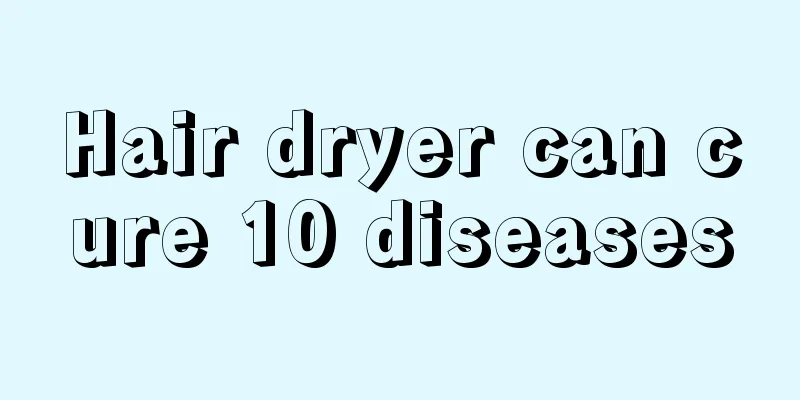What to do if tooth decay becomes inflamed

|
The reasons for toothache are different for everyone. Some are caused by anxiety and anger, some are caused by caries, and some are pain caused by internal oral infection. What should you do if a cavity becomes inflamed? Here are some tips to relieve toothache that you can try. If you want to completely solve the problem of tooth pain, you must find the root cause and prescribe the right medicine to treat it more thoroughly. 1. 4 ways to help you relieve toothache 1. Biting chopsticks with your mouth Hold the chopsticks with your mouth so that the painful tooth is suspended in the air, and hold this position for five minutes. This can reduce the pressure on the teeth and relieve pain. 2. Gargle with salt water Mix one spoonful of salt with half a bottle of water and rinse your mouth with salt water. Salt water can disinfect and kill bacteria, reduce bacteria on teeth and relieve toothache. 3. Contains Sichuan pepper Sichuan peppercorns can cause a numbing sensation when held in the mouth and can be used to relieve toothache. The specific method is to take a peppercorn and place it under the aching tooth. 4. Drink hot water after brushing your teeth Drink some hot water after brushing your teeth and rinsing your mouth to promote blood circulation in the gums. As the saying goes, those who are unblocked have no pain, and those who are in pain have no blockage. 2. Causes The currently recognized theory of the etiology of dental caries is the four-factor theory, which mainly includes bacteria, oral environment, host (that is, parasites including parasites, viruses and other organisms that parasitize on it) and time. The basic point is that cariogenic food sugars (especially sucrose and refined carbohydrates) are tightly attached to the tooth surface, forming an acquired film by salivary proteins. This acquired film is not only firmly attached to the tooth surface, but also has enough time and temperature to produce acid deep in the plaque, attacking the teeth, demineralizing them, and further destroying organic matter, resulting in caries. 1. Bacteria It is a necessary condition for the occurrence of dental caries. It is generally believed that there are two types of dental caries bacteria. One is the acid-producing bacteria, mainly Streptococcus mutans, Actinomyces and Lactobacillus, which can decompose carbohydrates to produce acid, leading to demineralization of tooth inorganic matter; the other is Gram-positive cocci, which can destroy organic matter and cause tooth cavities after long-term action. 2. Oral environment The oral cavity is the external environment of teeth and is closely related to the occurrence of caries, among which food and saliva play the dominant role. (1) Food It is mainly carbohydrates, which are related to the formation of plaque matrix and are also the main energy source for bacteria in plaque. Bacteria can use carbohydrates (especially sucrose) to metabolize to produce acid and synthesize extracellular polysaccharides and intracellular polysaccharides. The organic acids produced are beneficial to the growth of acid-producing and acid-resistant bacteria, and are also beneficial to the demineralization of dental hard tissues. Polysaccharides can promote the adhesion and accumulation of bacteria on the tooth surface and provide an energy source when exogenous sugar is lacking. (2) Saliva Under normal circumstances, saliva has the following functions. ① Mechanical cleaning effect; ② Antibacterial effect; ③Antacid effect; ④ Anti-dissolution effect. Changes in the quantity and quality of saliva can affect the caries prevalence. Clinically, the caries prevalence in patients with xerostomia or salivary secretion is significantly increased. Patients who undergo maxillofacial radiotherapy may have multiple caries due to damage to the salivary glands; on the other hand, an increase in the amount of lactic acid in saliva is also conducive to the occurrence of caries. 3. Host Teeth are target organs in the process of caries. The morphology, mineralization degree and tissue structure of teeth are directly related to the occurrence of caries. 4. Time The development of dental caries is a long process. It usually takes 1.5 to 2 years from the initial stage of dental caries to the formation of clinical cavities. Therefore, even if cariogenic bacteria, a suitable environment and a susceptible host exist at the same time, dental caries will not occur immediately. Only when the above three factors exist at the same time for a considerable period of time can dental caries occur. |
<<: What does tooth decay look like_What does tooth decay feel like
>>: What soup can increase lactation quickly
Recommend
Can I use salt water to wash my hair if I have hair loss?
Many men start to lose their hair when they reach...
What treatment method is effective for removing flat warts
Flat warts are what we usually call "warts&q...
What examinations are needed for pituitary tumors
After the occurrence of pituitary tumors, the pat...
How to have a nutritious diet for liver cancer
Experts say that based on the different condition...
How to dry orange peels
People who like to eat oranges may want to dry th...
What does WHO Ⅱ grade of breast cancer mean?
What does WHO grade Ⅱ of breast cancer mean? 1. W...
Will rhinitis turn into nasopharyngeal cancer?
Will rhinitis turn into nasopharyngeal cancer? 1....
What should women with ovarian tumors pay attention to
Ovarian tumor is one of the common tumors of fema...
Serrated adenoma of the colon
The colon is a part of the human intestinal tract...
Lactose intolerance
In our lives, some friends will have diarrhea aft...
Does thyroid cancer affect life expectancy?
Does thyroid cancer affect life expectancy? If th...
What is the difference between cassava and yam
Although cassava and yam have different names, th...
I don't know what kind of fruit fire is. So this is what it's about
Recently, it has been circulated on the Internet ...
Diet and lifestyle guidance for prostate cancer patients
Diet: It is recommended to eat a variety of veget...
Benefits of wearing a garnet bracelet
Pomegranates can be processed into different type...









